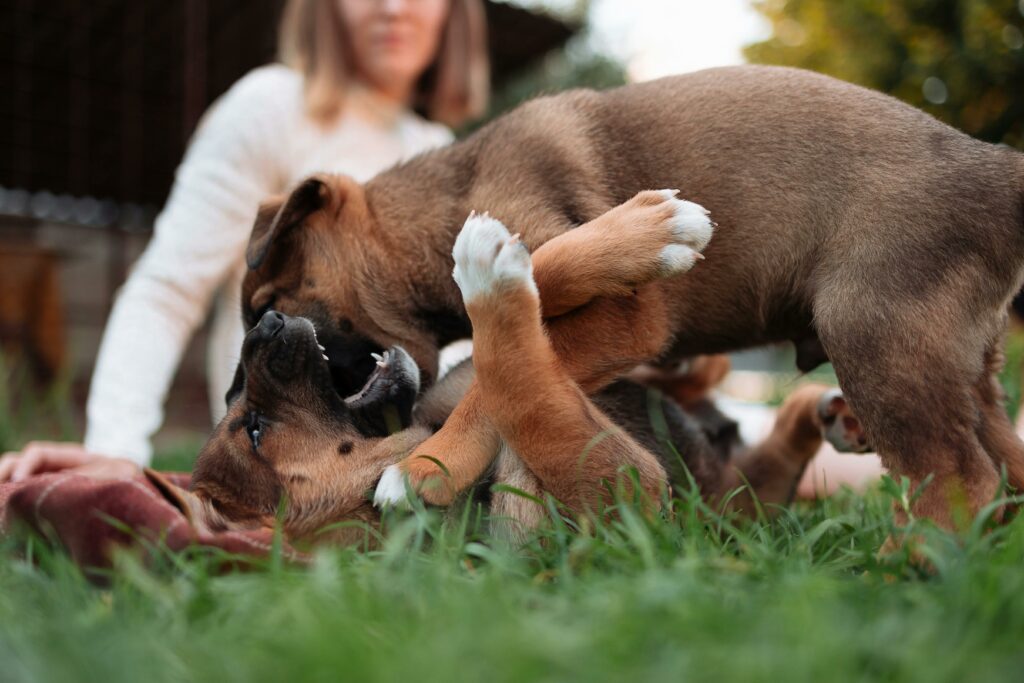Fair & Focused Discipline
I train to only use corrections for overt disobedience, and only for the obedience levels that the dog has proven himself appropriately trained and competent in through the Obedience Game. The Obedience Games are designed to give you a clear understanding of what obedience level your dog is at for which commands, thereby eliminating the problem of misplaced corrections. What form your corrections take depend on both you and your dog, and we’ll work together to determine what you’re most comfortable with. Games first, though. Obedience Games are the backbone of my training methodology. Discipline later, and then only to enforce what your dog’s already prepared for.

Why Discipline?

Why corrections (a disciplinary action) are used with dogs is the exact same as with parenting children, though the how is necessarily very different. Children that are never disciplined become spoiled, misbehave regularly, and walk all over their parents. Kids that are overly disciplined typically become aggressive or fearful, and usually develop problematic, unintended behaviors resultant from their childhood trauma. All of us parents are struggling to find this golden middle ground as best we know how.
There is no difference in any of this between dogs and kids. A dog that is never corrected is not a happier dog than one that is. It has an unhealthy relationship with its owner which causes frustration on both ends of the leash. Because it can’t be trusted, it has little freedom and a much smaller life than it deserves. These dogs often become reactive because they have no faith in their owner to take charge, and so long as the dog is never disciplined the root of the problem is never addressed and training devolves into clipping leaves while the roots only deepen.
Over-corrections can be disproportionate to behavior, or more commonly, not understood by the dog. Often, we think it is quite clear to the dog why it is being punished, but the dog is seeing things quite differently, becomes confused, and is destined to always receive punishments that come seemingly out of nowhere.

Abundant Misuse of Discipline
Your dog runs off after a squirrel or another dog (or for whatever reason) and you’re hollering at it to “COME!” in an angry voice. The dog knows this is breaking the rules and that you’re upset at it, but you have no means of correcting the dog any other way than with your shouts. Eventually, your dog slinks back with a guilty look, and since you and your dog both know it misbehaved, you grab its collar roughly and drag it inside saying “Bad Dog!”, or something like this. The problem is that while the dog probably does know that running off what bad, the real correction happens when it returns to you. To the dog, returning to you (not running away) resulted in punishment. This is confusing to the dog and will make its returning to you less likely in the future. You can discipline your child for cheating on a test a week ago because you’re able to explain to him why he’s being punished, but if you punished him a week later with no explanation, the child would be confused, feel betrayed, and would certainly not learn the intended lesson. Had you no ability to explain to the child why he was being punished, the only way to punish him for cheating would be during or immediately after the cheating, when cheating is forefront in his mind. This is how it is with disciplining dogs.
Moreover, it is far more often the case than not that a dog is disciplined for disobedience at a level it is not adequately prepared for. In the above example, we are giving a “come” command while the dog is following its prey drive, mid-chase. This is certainly achievable, but it is absolutely a Jedi level obedience task. Your dog chasing a squirrel, in that moment feels like its wolf ancestors hunting for survival, especially if it is a breed with a high prey drive. Any dog that obeys this command in this situation deserves all the praise you can muster, because that dog is a Jedi indeed. Can your dog reliably come when its outside smelling another dog’s poop? Will it even come in the distraction-free indoors if you don’t have a treat in your hand (and no high-pitched begging voice)? It is absolutely unfair to the dog to punish it for failing a Jedi level recall with only Basic level obedience training. But fear not, the obedience games are tailored to 1) build your dog up to this point, and 2) give you an active understanding of what is and isn’t fair discipline for your dog.

Your dog runs off after a squirrel or another dog (or for whatever reason) and you’re hollering at it to “COME!” in an angry voice. The dog knows this is breaking the rules and that you’re upset at it, but you have no means of correcting the dog any other way than with your shouts. Eventually, your dog slinks back with a guilty look, and since you and your dog both know it misbehaved, you grab its collar roughly and drag it inside saying “Bad Dog!”, or something like this. The problem is that while the dog probably does know that running off what bad, the real correction happens when it returns to you. To the dog, returning to you (not running away) resulted in punishment. This is confusing to the dog and will make its returning to you less likely in the future. You can discipline your child for cheating on a test a week ago because you’re able to explain to him why he’s being punished, but if you punished him a week later with no explanation, the child would be confused, feel betrayed, and would certainly not learn the intended lesson. Had you no ability to explain to the child why he was being punished, the only way to punish him for cheating would be during or immediately after the cheating, when cheating is forefront in his mind. This is how it is with disciplining dogs.
Moreover, it is far more often the case than not that a dog is disciplined for disobedience at a level it is not adequately prepared for. In the above example, we are giving a “come” command while the dog is following its prey drive, mid-chase. This is certainly achievable, but it is absolutely a Jedi level obedience task. Your dog chasing a squirrel, in that moment feels like its wolf ancestors hunting for survival, especially if it is a breed with a high prey drive. Any dog that obeys this command in this situation deserves all the praise you can muster, because that dog is a Jedi indeed. Can your dog reliably come when its outside smelling another dog’s poop? Will it even come in the distraction-free indoors if you don’t have a treat in your hand (and no high-pitched begging voice)? It is absolutely unfair to the dog to punish it for failing a Jedi level recall with only Basic level obedience training. But fear not, the obedience games are tailored to 1) build your dog up to this point, and 2) give you an active understanding of what is and isn’t fair discipline for your dog.

How Dogs Correct Each Other
There are a select few dogs out there that need no more than a firm, “AGH” without first using a physical correction. People are exponentially more verbal than dogs, which are primarily physical animals. We humans can be greatly affected by kind or critical words–“I love you”, “I hate you”, “I’m proud of you”, “I’m disappointed in you.” The vocalizations of dogs don’t have remotely the same influence on one another that ours do to one another. Conversely, it would be a tad inappropriate from me to stick my nose up a stranger’s butt, then proceed to wrestle him until he socks me in nose to let me know I’m playing just a little too rough–and no hard feelings would be had. Physical corrections are rarely appropriate or necessary between people, but they are the language of dogs. We humans typically resort to physical discipline only when we lose our tempers, which means we have a great deal of responsibility to learn how to use these physical corrections appropriately, fairly, and dispassionately when communicating with our dogs.
There are a select few dogs out there that need no more than a firm, “AGH” without first using a physical correction. People are exponentially more verbal than dogs, which are primarily physical animals. We humans can be greatly affected by kind or critical words–“I love you”, “I hate you”, “I’m proud of you”, “I’m disappointed in you.” The vocalizations of dogs don’t have remotely the same influence on one another that ours do to one another. Conversely, it would be a tad inappropriate from me to stick my nose up a stranger’s butt, then proceed to wrestle him until he socks me in nose to let me know I’m playing just a little too rough–and no hard feelings would be had. Physical corrections are rarely appropriate or necessary between people, but they are the language of dogs. We humans typically resort to physical discipline only when we lose our tempers, which means we have a great deal of responsibility to learn how to use these physical corrections appropriately, fairly, and dispassionately when communicating with our dogs.
